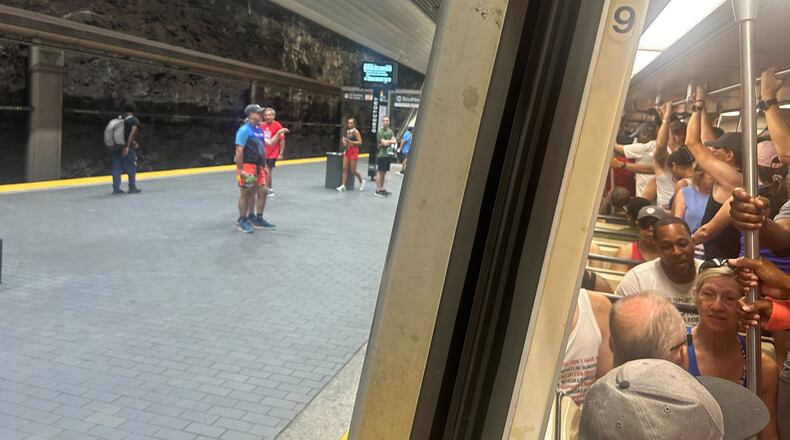A MARTA train that broke down on a key part of the tracks caused a ripple effect of delays Friday morning that kept some AJC Peachtree Road Race runners from arriving at the starting line on time.
The northbound train was headed into service when it experienced a mechanical issue and became disabled at 5:42 a.m., a little more than an hour before the first wave of runners were to set off from Lenox Square.
The train broke down on a portion of the tracks that’s called a double crossover, MARTA spokesperson Stephany Fisher said.
A double-crossover, essentially an X in the tracks, is a point on the line that can be used in situations like this to let trains cross from one side of the tracks to another and bypass a stalled car.
But because this train stalled inside the crossover, it complicated efforts to reroute trains around it. The situation created a traffic jam that set back MARTA’s efforts on a day where it had put extra trains into service and increased frequency in order to accommodate the 50,000-plus runners.
“It really was a worst-case scenario,” Fisher said.
Credit: AJC
Credit: AJC
Maneuvering around the stalled train required northbound trains to reverse and double-back at another crossover, while southbound trains had to hold.
“It required careful coordination,” she said.
Some of the extra trains put into service for race day ended up stuck behind the broken train and had a lengthy wait before being able to pass, she said.
The broken train was towed at 6:37 a.m. and service resumed on the north and southbound lines. But by that point, crowds had swelled at many stations, particularly those at the northern ends of the system. A medical emergency at Lindbergh Station just before 8 a.m. caused minor additional delays.
All of the service issues were resolved by the time runners started crossing the finish line and heading back to MARTA to get home.
A spokesperson for the Atlanta Track Club, which encourages riders to take MARTA because parking at Lenox Square is limited, said it kept the starting line open 10 minutes later than planned to let “a small number” of late runners join the race.
“We’re glad we could adjust the schedule and still maintain a smooth and safe start for everyone,” Natalie Cabanas said.
Riders on social media reported waiting between 45 minutes and an hour to catch a train at the two northern-most stations, Doraville and North Springs. Others reported waiting at least a half hour. Trains were scheduled to arrive every 12 minutes.
Similar to when service issues were reported last month after a Shakira concert and last fall during Pride weekend, riders said poor communication from MARTA compounded their frustration with the delays.
Credit: Ben Gray
Credit: Ben Gray
When Kenton Wallace and his daughter arrived at the Doraville Station platform a little after 6 a.m., he said the signs said a train was coming in seven minutes. The timer counted down the minutes until the sign said one was approaching “now,” but no train arrived.
Wallace said the clock counted down and restarted three times before a train arrived. There was an announcement on the public address system but he and other riders couldn’t understand what was being said.
Crowds still weren’t clear at some stations by the time the first wave of runners set-off at 6:50 a.m.
The platform was full of people standing shoulder-to-shoulder by the time a train arrived, Wallace said. At the next stop, a few people were able to get on. The platform was again full at the second stop but no one else was able to get on.
“I felt for those people,” Wallace said.
Some folks left the station and found other ways of getting to the race. Wallace said he talked with one runner after the race who said he took an Uber, and was joined by strangers who asked if they could hop in, too.
Northbound trains faced similar issues. As a train pulled up to Peachtree Center Station just before 6:30 a.m., runners on the platform found themselves face-to-face with runners packed inside the cars and quickly realizing there wouldn’t be enough room.
Those who made it on were seen glancing down at their watches.
Delays getting to the starting line meant more runners began the 6-mile route later than they would have otherwise, as temperatures continued to rise.
Among the K wave, which kicked off at 7:40 a.m., were runners with C and B wave bibs who were scheduled to start the race roughly a half-hour earlier.
Cole Ferrari and his friend Landon Varah took MARTA from the Midtown Station and waited about 15 minutes for their train. They were scheduled to begin in one of the last waves but worried they wouldn’t make it to the starting line before it closed.
Once they got off at Lenox Station, Ferrari said they sprinted to the starting line.
“It was packed,” Ferrari said. “We weren’t the only ones sprinting.”
After their mad dash to the starting line, the real race began.
Wallace said he worries about the sour impression the morning’s experience left on people who don’t ride MARTA regularly. He said he heard lots of complaints from fellow riders the platform.
“They were already talking about taking different transportation here next year,” he said. “The vibe was that MARTA is not reliable.”
Wallace said he told complainers that he’s never had issues like this before and described it to them as an exception on MARTA, not the rule. But at the same time, he’s not sure he’ll take it to the race next year, either.
AJC staffers Allison Mawn, Gray Mollenkamp and Scott Trubey contributed reporting.
About the Author
Keep Reading
The Latest
Featured


